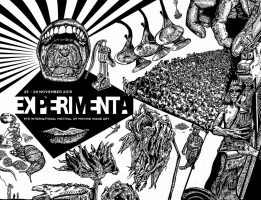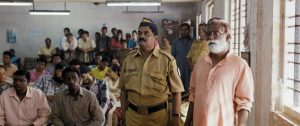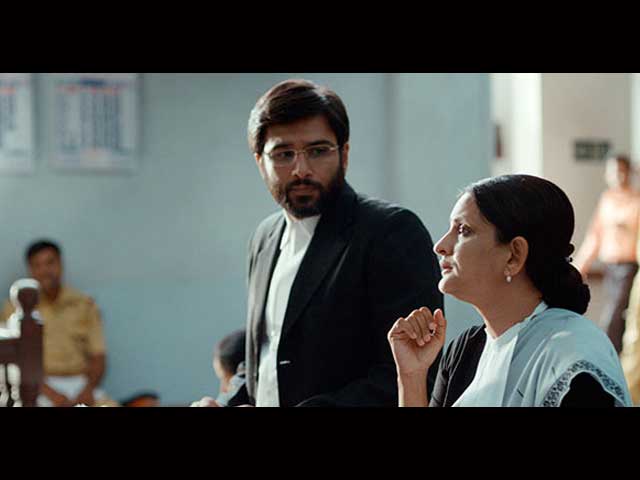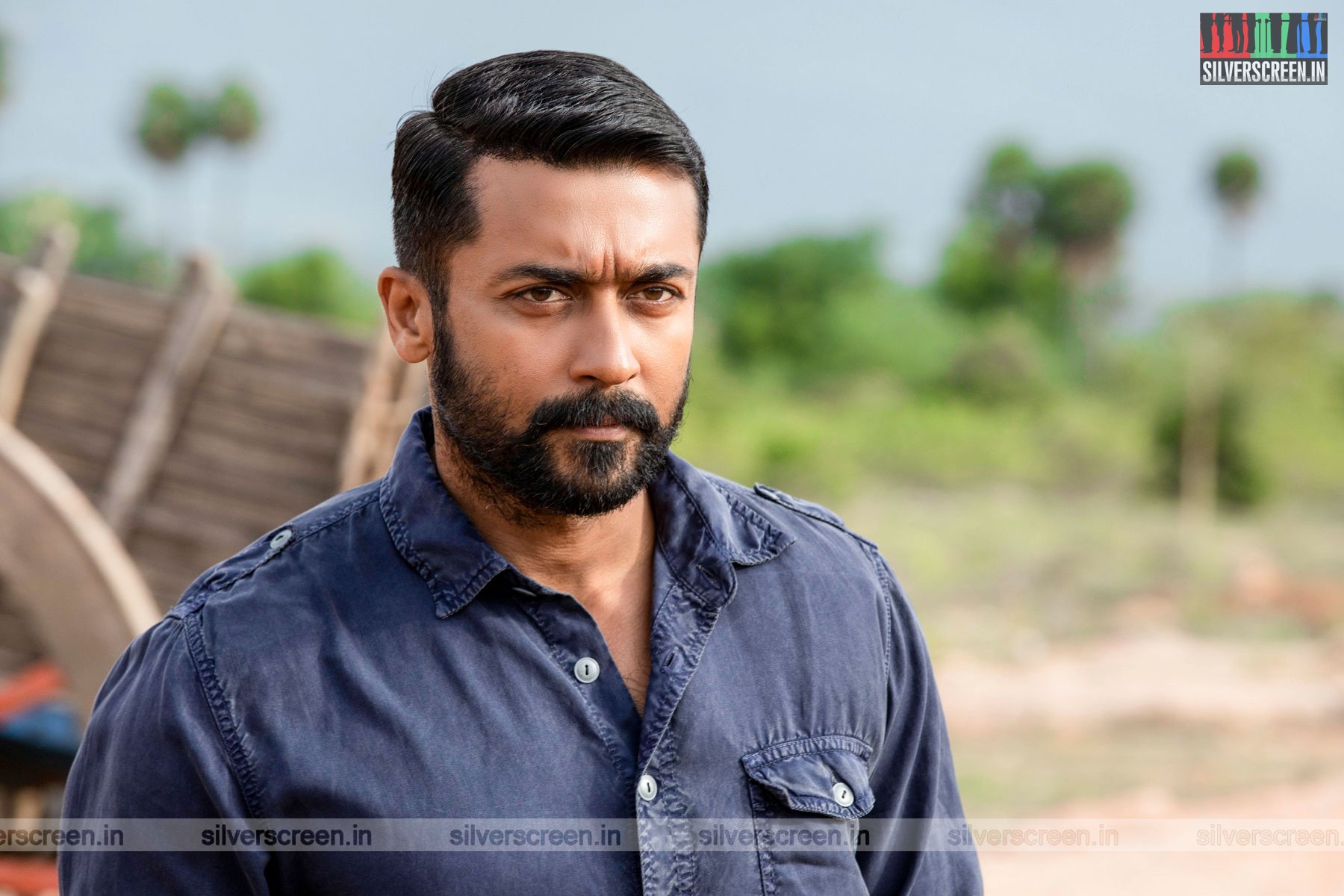For the past three days, Chaitanya Tamhane’s Court has being screened in Bangalore, as a part of Experimenta, the ninth edition of the International Festival of Moving Image Art, organised by the Goethe-Institut and Srishti Institute of Art, Design & Technology. The critically acclaimed multilingual courtroom drama has won a number of international awards, and is India’s nomination for this year’s Oscars. Chaitanya Tamhane attended the opening day’s screening, and on Day 3, the audience got to interact with producer Vivek Gomber, who shared a gritty behind-the-scenes tale of how Court was made.
*****

Image Courtesy: Experimenta 2015
In the age of for and against, truth and falsehood. In an age when every other film is a war film with a good side and a bad side. In this time, Court strikes a momentous chord, with its use of still shots, with its realism, with its presentation of the multiplicity of truths, its recognition that each person’s subjective reality is valid. And what happens, when these subjectivities have to negotiate with each other, and with institutions. The aim of the Experimenta festival is to support “uncompromising, fresh, compelling and critically urgent experimentation with the moving image in India”. And Court is the vanguard feature-length film. How did this journey begin? Producer and actor Vivek Gomber is present, and takes us through the process of making Court.
*****
The first thing Vivek Gomber points out is that while Court might be riding high right now, it began with a host of rejections. “Before Venice was confirmed, we were rejected by a lot of places. We had 6-7 rejections from top-tier festivals. If Venice hadn’t happened, we would have been in a strange position, because right after Venice there aren’t any top-tier festivals in the calendar. We were under a lot of pressure.
“We only thought about releasing it after the festivals happened. We won a $100,000 in Venice.” With pride he adds that Venice is the oldest film festival in the world. He laughs suddenly, “The hundred thousand is split equally between the director and the producer. 50,000 for me, and 50,000 for Chaitanya. That money gave us a lot of confidence. We also then won at MAMI, which was 50 lakhs. So all of a sudden, we had 1.2 crore in our pocket! We decided to keep that money, and try and release the film on our own.
“Everything that has happened with the film, we’ve also adapted to it. It’s easy to look back now and say ‘oh you must have made all the right calls’ but we were just responding to how the film was being received.”
*****

court-image
With affection in his voice, he reminisces about what it was like for a 20-something Chaitanya to face parental pressure after making a short film. ‘What’s next for you?’ they would ask. ‘When are you going to leave all this and get a job?’ Gomber says, “I was very depressed to hear that, because I felt after having worked with Chaitanya and seeing his short films that he’s quite incredible.
It’s incredible to have a voice like that in the country.”
They talk, and Gomber encourages Chaitanya to just go and explore his ideas. Chaitanya comes back after a month and tells him about sitting in courtrooms, at police stations, and says ‘I’m very curious to know what happens in a courtroom.’ It was June 2011, and a lot was going on. “There was a financial crisis, there was the Arab Spring, there were a lot of conversations happening around the world, which were very interesting.” Gomber tells Chaitanya to work on that text, and Chaitanya says he needs time to research. Initially Chaitanya isn’t comfortable with taking money from a friend, but Gomber convinces him, adding that he can only give him a fair amount. “It’s not like if he asked for lakhs I would give it to him,” Gomber says with a smile.
*****
2012. Within a year, the script is done. Gomber loved the script, and for two months didn’t talk to Chaitanya, until he could sort out his money affairs. “You hear a lot of stories about people promising people stuff, and then, it never happens. It was very important to come back and clearly say whether we’re doing this, or not doing this.” Gomber sorted out his finances, counted on co-production, or even support from the Government. Remembering this now, he laughs.
*****
Neither Gomber nor Chaitanya wanted to do auditions the normal way. “We talked about how you get frustrated as an actor when you go to auditions. What is an audition process? And how we don’t want to do auditions like that. For eight months we went around, and ended up having a database of 1800 non-professional actors from all over Maharashtra. Like we have Narayan Kamble, and this is his first job as an actor. He’s from Nagpur, the editor of a magazine called Vidrohi, and he’s an activist. And he’s not sung the songs, he lip-synced. For a non-professional actor to be able to shoot like this, I think he’s more professional than the professional actors.”
Gomber also emphasised the importance of preparation, for which they spent an entire year. They talked to lawyers, went to courts, everybody had a job to do. It was a slow process, and they had to develop the process. Develop the language.
“One year of writing. One year of prep. Then we shot it for two months in April-May 2013.” Gomber never pushed Chaitanya to finish shooting in time for any festival. “My only condition,” says Gomber, “was that we can’t look up each other after the film and say ‘I wanted this done, this should have happened’. It should be – this is a finished work, we’ve done it, and we’re proud. We’ll see what happens when we get to that.”
*****
Recommended
Gomber says Chaitanya made it very easy for him as a producer. “You can see the command of the director. The text was locked. Everything is intentional, and as a producer you feel very good. You have a director who is going to stick to the text. It kind of makes it easier to budget, to visualise.” Appreciating the director for what he’s managed to bring in, Gomber also points out, “You also have to appreciate him for what he doesn’t talk about, what he doesn’t bring in. Those temptations that you can have. I thought he was very brave with this.” About all, this has been one of the best features of Court. Painting a marvellous panorama of individuals, not making them compete or drown each other out.
But Gomber has to be given credit for backing a film like this, because not every producer would have done it. Gomber says, for him, to step up and do Court “came out of a lot of frustration.” He speaks from his own experience as an actor, when he says, “We’re not using anyone properly. We’re not using actors properly. There are a lot of trained actors out there who aren’t given texts to explore. The texts are not being given because writers are not being paid to write that text. They’re not being paid to write that text because the producer won’t put in money. The producer won’t put in money because the exhibitor won’t show something that won’t go house full. For the exhibitor there are only XY amount of cinemas for a country of 1.2 billion people.
So how can we have more venues which will show these films so we aren’t obligated by these Friday, Saturday, Sunday, box-office bollocks?
“You have ideas about this, but when you do it, you realise ‘oh, it’s really like this’. That part is disappointing, and disheartening. It’s shaken me up a bit.” Laughing at how precarious the situation is, he says, “You can’t make money in this profession. You have to make your peace with what you do.” Or else, you might as well admit that your parents were right and you were wrong, and you should have got yourself a real job.
*****

court2-image
With no money coming in, Gomber had to do some serious stock-taking of his funds. He knew exactly how much, and how little, his money could be stretched. He admits, “I knew what I could sell to raise the remaining money.” The audience laughs, and he laughs, but it’s not funny, because it’s all too real. “You cannot shut shop in the middle, can you? It was a strange position to be in. I didn’t know what to do. And in the end I decided, I’ll just put my own money in. And I’m not alone. Many people have done it. If you know, there’s a Marathi film called Khwada, which has been made by a farmer. He sold his land. He has no money now. But he’s got his film out there. He’s not alone.”
European film-makers get a certain amount of money from their governments. That’s why collaboration works out there. “But, we like in America, have to put in our own money.” He adds hopefully, “Maybe the government will wake up one day. But then I don’t know what they’ll do with the funds. How will they decide? What jury will decide what will work and not work? We were given zero out of five. Court was given a zero for its script. It was rejected.”
And now it’s en route to the Oscars. Here’s wishing Gomber and Chaitanya the very best for a truly magnificent film.
*****
Images Courtesy: Experimenta 2015, Court stills



